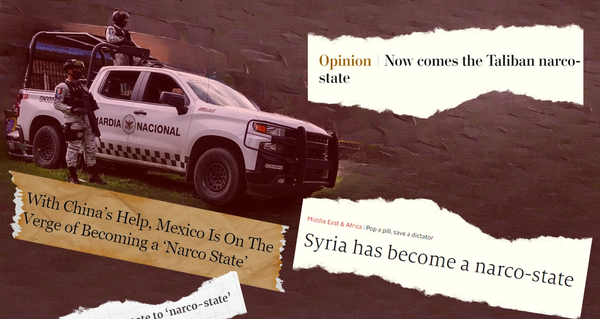TalkingDrugs collage
El idioma importa: ¿Es mi país un "narcoestado"?
Al simplificar la compleja relación entre los actores estatales, los ciudadanos y las economías informales globalizadas de la droga, el término sirve a menudo para alimentar la estigmatización, los estereotipos nocivos y el aumento de la violencia. Más información, en inglés, está disponible abajo.
The term “narco-state” has been used by politicians, journalists, and law enforcement agencies since the 1980s. While it was initially used to describe Latin American nations like Colombia, Bolivia, Peru, and, a few years later, my home country of Mexico, the term has continuously been applied to more and more countries.
In 2008, the United Nations Office on Drugs and Crime (UNODC) referred to Guinea-Bissau as Africa’s first “narco-state”. This label has also been liberally applied, particularly by the media, to countries across Asia, like Afghanistan, Syria, Myanmar, among others. Definitions of a “narco-state” vary; some focus on the state’s economic reliance on the drug market, others define a certain level of institutional corruption, or comment on levels of insecurity. What is similar between all these countries is that drug trafficking is perceived as a source of political power and economic gain, leading to complex relationships between state actors and drug traffickers.
More recently, the chairman of the police board in the Netherlands has used this label to describe the country’s escalating drug-related violence, making it the first European country to be labelled as a narco-state. However, he was quick to qualify: “We aren’t Mexico”.
The Netherlands’ narco-state description has also been used to argue against the decriminalisation of drugs, blaming their non-punitive drug model for attracting the illegal drug trade. Again, the author draws a clear distinction:
“Unlike countries like Mexico or Colombia, the Netherlands is one of the richest and most developed economies in the world. It has a sound rule of law, low levels of corruption, and a very low murder rate.”
Blaming decriminalisation for the creation of the Dutch narco-state was argued by the Argentinian politician Patricia Bullrich, demonstrating the dangerous potential of how this label opens a field of prohibitionist attacks that undermines drug policy reform.
Discussions of a narco-state resurged in Mexico during the trial of the former Public Security Secretary, Genaro García Luna, who has been found guilty for facilitating bribes to protect organised criminal groups, and simulating the destruction of 23 tons of cocaine, only to return the original shipment to traffickers.
It’s easy to understand why there’s a need for a term for the historical, powerful, and violent collaboration between organised crime, high-profile politicians, and armed forces. However, it’s important to question the validity of this term, what sort of consequences its use encourages, and how it may be perpetuating the already significant stigma and discrimination against people in these countries, whether they’re involved in the drug trade or not.
